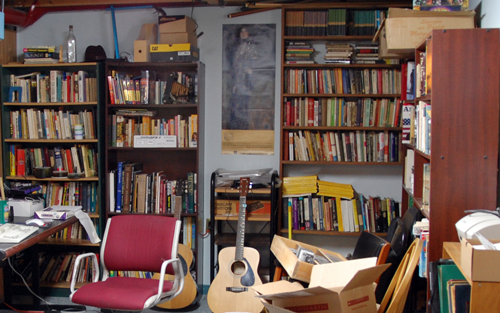
"The drive-through, which accounts
for 60 percent of the chainís business in the United States, was
reconfigured to become more efficient...." The New York Times in an
article on the resurgence of the McDonald's Restaurant chain, January 11,
2009.

The Amazon
electronic book
reader. It connects to Amazon through a wireless network-- that is not
compatible with European standards. Has the publishing industry
learned anything from the music industry? Indeed they have: they
appear to be just as stupid. A monthly subscription to the New York
Times on Kindle-- which is free, online-- is $13.99. All right, so you
buy a Kindle, and you decide to read five or six online news magazines or
news papers, a few books, a few reference works... how long before you
arrive at over $100.00 a month? And you are paying this for a
technology that eliminates the publisher's need to actually print something,
on paper, and transport it to your eager little hands.
Add that to your cable bill,
your phone bill, your cell bill, your iTunes bill, your movie rentals, and
your CD collection... I think they've lost their minds. Why not
do what Google, and most online newspapers have learned to do?
Discretely sell some advertising in a non-intrusive way and hope to earn
back the revenue through volume of hits?
I do not know what to do with my
books. I don't even know how many I have. Probably over a
thousand. They sit on their prefab bookshelves, two layers deep, along
my basement wall. They look fine. They testify to my learning
and erudition. They show that I am not one of the thoughtless mob who
spend hours and hours watching television.

Books have become very, very
expensive. I know of a student at the University of Waterloo who
recently spent over $900 for her course books. Is there some kind of
scam going on with the universities and book publishers? Students are
always told they need the latest, newest, revised edition. No effort
is made to make new editions compatible with old editions, by retaining a
consistent paging sequence, or by publishing addendums, or online updates.
How on earth can a laptop computer
cost less than your course books? The computer requires thousands of
manufactured parts from all over the globe, carefully assembled and tested,
and shipped thousands of miles. Yet you can buy a new laptop for $500
or $600 nowadays. You can buy a lawnmower for $240. You can't
buy five books for less than that?

I think we need a movement.
We need a group of intellectual hackers to devise an alternative to the
established publishers, to write new text books and publish them on
electronic readers like the Kindle. We need students to organize
themselves and demand that professors adopt these new electronic books for
their courses.
Their objection, of course, will
be that they only want this particular book, a printed, published one, for
the course. Only this book will do. Just as, in the computer
world, first it was "only IBM will do" and then "only Microsoft will do".
Finally today, more and more users, including governments and corporations
have discovered Linux.
What would happen if Universities
supported this movement and began to require that all books be supplied in
digital format and that they cost less than $20 each? Well, what would
happen if they told the publishers they were no longer going to buy their
inefficient, over-priced, tree-slaying compendiums? The publishers
would have no choice. First, they would claim that they would be
driven out of business. Then some smaller, more nimble publishers
would start filling the gap. Then the big companies would buy them out
and double their prices.
If there are enough hackers out
there to support Linux-- very efficiently, I might add-- then there must be
enough intellectuals, scientists, and others who would support a new "open
source" text book system. In fact, isn't Wikipedia a demonstration of
this exact idea?
Copyright © 2009 Bill Van Dyk All rights
reserved.
All contents copyright 2005 Bill Van Dyk
| 



